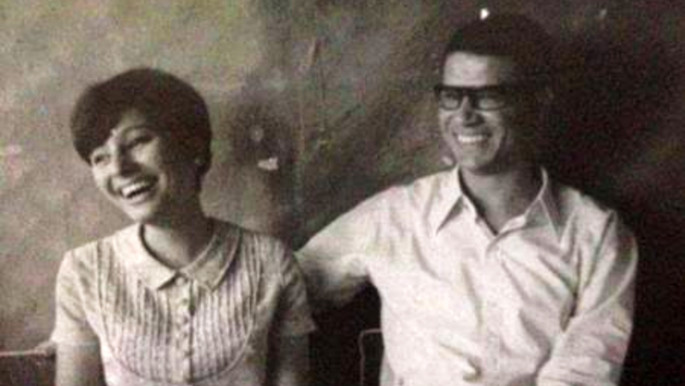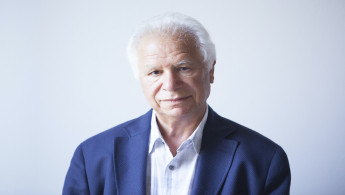'The homeland does not leave the body until the moment of death': Remembering Mourid Barghouti
"I was devastated to hear the news of Mourid's sudden death last Sunday. Palestinians — and the world — lost a literary force like no other," said Michel Moushabeck, musician, author and founder of Interlink Publishing.
"Mourid Barghouti will be remembered as a Palestinian icon, a literary giant, and one of Palestine's most beloved poets. I've known him also as a fearless critic of Israel and a relentless advocate for Palestinian rights. But above all, he was a genuinely decent human with three passions: family, Palestine, and literature.
"A couple of years ago we went to Delhi together on a speaking tour and I have very fond memories of good times we spent together. He will be missed enormously."
Born in 1944, four years before the Nakba, in the village of Dier Ghassanah, near Ramallah, Mourid Barghouti's family is one of the largest and most well-known families in Palestine.
While living in Egypt, where he was studying English Literature at Cairo University, the 1967 Arab-Israeli War broke out, resulting in Barghouti spending the majority of the rest of his life in exile.
 |
Barghouti will be remembered as a Palestinian icon, a literary giant, and one of Palestine's most beloved poets |  |
It was while he was at university that he met his wife, the late renowned Egyptian novelist, Radwa Ashour.
 |
|
| Read also: A love in letters |
Unable to return to Ramallah due to the Israeli occupation, once his study visa expired Barghouti took up a job in Kuwait.
Here he made plans to return to Egypt and marry Ashour, which he did in 1970.
Barghouti and Ashour's love story is one that is well-known and celebrated until today. They had one son, Tamim, who inherited his parents' literary flair, and is a poet too.
After he returned to Cairo in 1971, Barghouti became a political commentator for Radio Palestine, which flourished under the rule of Gamal Abdel-Nasser, but was shut down by his successor Anwar Sadat.
Sadat had Barghouti arrested and deported in 1977 and the writer spent the next 17 years of his life exiled in Budapest, Hungary, separated from his wife and son, only seeing them during holiday seasons.
In Hungary, Barghouti was part of the Palestinian Liberation Organisation (PLO)'s cultural attaché, however Barghouti was quick to point out that he was politically independent, and not part of its inner circle.
During his life in exile Barghouti lived in a total of 46 houses, spanning three continents.
Barghouti had 12 collections of poetry published, including Midnight and Other Poems, which was translated into English by Ashour.
 |
|
|
Barghouti with his late wife, Egyptian author Radwa Ashour [Twitter] |
In addition to his poetry, Barghouti is known for his two memoirs. The better known of the two is I Saw Ramallah, first published in 1997, which was then translated into numerous languages, including English. Bloomsbury re-published the English translation in 2004.
I Saw Ramallah is based on Barghouti's experience of returning to Ramallah for the first time in the 1990's, after decades in exile. Edward Said called I Saw Ramallah one of the finest existential accounts of Palestinian displacement, and the book won the Naguib Mahfouz Medal for Literature.
The memoir of a displaced Palestinian is different to that of someone who left their country for a number of years but is free to return.
 |
I read I Saw Ramallah, a few years after 9/11 when I was reaching for words and art to help ease the feeling of alienation that became even more acute for Palestinian Americans like myself |  |
"I read I Saw Ramallah, a few years after 9/11 when I was reaching for words and art to help ease the feeling of alienation that became even more acute for Palestinian Americans like myself," recalls Sahar Mustafah, author of The Beauty of Your Face.
"Immediately and incisively, Barghouti's work revealed how disparate my experience as a second-generation citizen of the United States would always be from the generation of the Nakba, whose destinies were thrust into limbo, and whose perpetual state of landlessness would become the inheritance of their children and their children's children.
"It was a lesson in humility and an examination of privilege. It affirmed that every Palestinian's return — if ever allowed — is uniquely painful and fraught," she added.
Through I Saw Ramallah, we see the many questions and fears that arise in Barghouti's mind as he returns to Palestine, fears over something suddenly changing so that he cannot gain entry into the West Bank, and fears that this return is temporary and might not be possible again. Hence it is an insight into the psychology of a displaced Palestinian, as much as it is a tale of return.
Barghouti's sequel to I Saw Ramallah, called I Was Born There, I Was Born Here, was published in 2009, and translated into English in 2012. It follows his account of taking his son Tamim to Ramallah for the first time.
"The power and delicacy of Barghouti's prose writing to me is found most explicitly in his account, The Driver Mahmoud, contained in his memoir I Was Born There, I Was Born Here," Selma Dabbagh, author of Out of It tells The New Arab.
"It is a piece of writing that wraps all the challenges and obstacles facing Palestinians, as well as their divisions and cohesion into one taxi journey from Ramallah to Jericho. The register moves seamlessly between the quotidian to the heroic, the comedic to the tragic, throughout a ride which should, in unoccupied circumstances, take a matter of minutes."
In his later years, Barghouti spent his time touring the world, delivering readings of his work, and giving lectures at universities on Arabic poetry.
 |
I think every Palestinian has a unique story that is similar to none of the stories of others, but at the same time, each story of the Palestinians will find a shared element |  |
Barghouti's work is adored because not only does it succeed in capturing the Palestinian diaspora's collective experience of displacement and exile through the emotions of sumood, or steadfastness — the feeling of longing for the homeland, and their fortitude — both his poetry and his prose are beautifully lyrical.
Through his poetry Barghouti was very much about humanistic experiences, as opposed to a purely political one.
He focused on the aesthetics, allowing readers to visualise the little things, such as the scent of an orange, or the falling of night. Barghouti spoke of love, loss, suffering, and death.
His poems act like a gallery of windows, allowing readers to peer through each one to witness a particular scene. The words are quiet, but not without having a profound effect on the reader.
He once said, "I think every Palestinian has a unique story that is similar to none of the stories of others, but at the same time, each story of the Palestinians will find a shared element... Our stories are really different and unique, but at the same time, they are one, because what is shared is huge."
Barghouti joins the echelons of other great and departed Arab literary geniuses, always to be celebrated and never forgotten.
Yousra Samir Imran is a freelance journalist based in West Yorkshire. She is the author of Hijab and Red Lipstick, published by Hashtag Press in October 2020.


